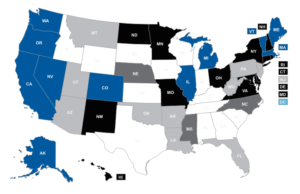
 There are only 13 days left until the election. We’re hard pressed to find anyone who says 2020 has been a good year, but perhaps the last couple of months are shaping up to deliver good news to the cannabis industry.
There are only 13 days left until the election. We’re hard pressed to find anyone who says 2020 has been a good year, but perhaps the last couple of months are shaping up to deliver good news to the cannabis industry.
 AT THE FEDERAL LEVEL, there is hope that the 83-year prohibition on cannabis is nearing its end – if the Democrats win the White House, retain the House of Representatives and take control of the Senate.
AT THE FEDERAL LEVEL, there is hope that the 83-year prohibition on cannabis is nearing its end – if the Democrats win the White House, retain the House of Representatives and take control of the Senate.
“If the Democrats do a clean sweep, then de-scheduling with interstate trade is definitely within the realm of possibility,” Randal Meyer, the executive director of the Global Alliance for Cannabis Commerce (GACC), told Marijuana Business Daily.
DE-SCHEDULING would not only legalize marijuana at the federal level, it would end 280E tax restrictions, open banking to cannabis companies and permit interstation and international cannabis trade. Because the Marijuana Opportunity Reinvestment and Expungement (MORE) Act is already sitting in the House, it would likely be the “vehicle” used to de-schedule.
ASSUMING ALL THAT HAPPENS, it is unclear how to construct a regulatory framework. Cannabis does not fit neatly into one category that can be regulated by the FDA, as it is food, a drug and a cosmetic. Some industry recommendations include a hybrid approach, allowing states to continue enforcement and the FDA and Alcohol and Tobacco Tax and Trade Bureau oversee interstate cannabis trade.
More than $3 million on lobbying for cannabis reform in Congress has been spent this year in Congress. Click here to see a chart showing the money spent.

Click to see the Marijuana Policy Project’s breakdown of states’ positions on legalization.
AT THE STATE LEVEL, it’s all about ballot measures. Voters in five states will decide on legalization of cannabis for recreational or medicinal purposes. If all five measures pass, medicinal marijuana will be legal in 38 states, as well as Washington, D.C., and Puerto Rico, and adult-use will be legal in 14 of those, and in D.C.
Arizona, Montana, and New Jersey will vote on whether to legalize marijuana for adult use.
Mississippi will vote on whether to legalize medical marijuana. Currently, it is legal in 33 states.
South Dakota would become the first state to approve both medical and recreational cannabis markets simultaneously. The state’s current marijuana possession laws are considered the harshest in the country.
News
Colorado Cannabis Sales and Tax Revenue Reach Record High
/in Uncategorized /by AdminColorado cannabis sales exceeded $2.22 billion in 2021, marking a new high for the state’s steadily maturing cannabis market. The public’s share of the pie also increased, with the state collecting more than $423 million in tax and fee revenue. And that doesn’t include the tens of millions of dollars in local cannabis tax and fee revenue collected by municipal governments across Colorado.
The Denver Post reports:
Read more
New High for Legal Marijuana
/in Legislation /by AdminSupport for cannabis legalization in the U.S. is stronger than ever before, according to a Gallup Poll released November 9. It found two out of three Americans (68%) think the use of marijuana should be made legal, while just 32% think it should remain illegal. This includes majorities of most demographic subgroups, including gender, age, education and household income. Support is also steadily growing stronger among Republicans, with half (48%) now in favor of legalization.
According to Gallup:
Ahead…
/in Legislation, Politics /by AdminSo what does this mean in the short term for the industry?
There are some potentially positive developments, but we will have to wait and see (again) what happens in the next few weeks.
Here’s the current federal landscape:
Meanwhile, as the feds fiddle, Colorado continues to thrive . . .
/in Colorado, Legislation, Politics /by AdminOn Election Day, 12 towns voted on cannabis tax issues, allowing cannabis sales, or both.
Read more
The future is green
/in Legislation /by AdminNow that voters in four states – New Jersey, Montana, Arizona, and South Dakota – approved recreational marijuana, and voters in one state – Mississippi – approved medical marijuana sales, expect more states to follow, experts say.
In fact, governors in New York, Pennsylvania, Rhode Island, Connecticut and Virginia have started seriously considering legalizing adult-use cannabis in 2021.
Good news on driving while impaired
/in Uncategorized /by AdminA new study shows that while driving after cannabis use was more prevalent in legal cannabis states, driving while high was actually less common. Researchers recommended states use public education campaigns – such as the Don’t Drive High campaign by CDOT – to effectively decrease impaired driving.
Not all Canadians are nice
/in Crime, Humor /by AdminColumbian drug lords were known to keep lions, tigers, hippos and venomous snakes, but Canadian drug traffickers have different taste in exotic animals.
A recent police bust just north of Toronto recovered $150 million worth of illegally-grown marijuana, guns, crossbows and . . . THREE kangaroos and TWO zebras.
No word on who owned them and why. More…
Counting Down…
/in Legislation, Politics, Trump /by AdminDE-SCHEDULING would not only legalize marijuana at the federal level, it would end 280E tax restrictions, open banking to cannabis companies and permit interstation and international cannabis trade. Because the Marijuana Opportunity Reinvestment and Expungement (MORE) Act is already sitting in the House, it would likely be the “vehicle” used to de-schedule.
ASSUMING ALL THAT HAPPENS, it is unclear how to construct a regulatory framework. Cannabis does not fit neatly into one category that can be regulated by the FDA, as it is food, a drug and a cosmetic. Some industry recommendations include a hybrid approach, allowing states to continue enforcement and the FDA and Alcohol and Tobacco Tax and Trade Bureau oversee interstate cannabis trade.
More than $3 million on lobbying for cannabis reform in Congress has been spent this year in Congress. Click here to see a chart showing the money spent.
Click to see the Marijuana Policy Project’s breakdown of states’ positions on legalization.
AT THE STATE LEVEL, it’s all about ballot measures. Voters in five states will decide on legalization of cannabis for recreational or medicinal purposes. If all five measures pass, medicinal marijuana will be legal in 38 states, as well as Washington, D.C., and Puerto Rico, and adult-use will be legal in 14 of those, and in D.C.
Arizona, Montana, and New Jersey will vote on whether to legalize marijuana for adult use.
Mississippi will vote on whether to legalize medical marijuana. Currently, it is legal in 33 states.
South Dakota would become the first state to approve both medical and recreational cannabis markets simultaneously. The state’s current marijuana possession laws are considered the harshest in the country.
Dazed and Confused
/in Crime, Research /by AdminA recent report from the ACLU found that black people were 3.6 times more likely to be arrested for cannabis possession than white people. And in Montana, which is voting on legalization in less than two weeks, Black people were about 9.5 percent more likely to be arrested.
The Maturity of the Market
/in Economy, Research, Sales /by AdminColorado cannabis users have spent about $1.42 billion on cannabis through August, positioning the industry to exceed $2 billion in 2020 sales – four years earlier than industry experts’ predictions.
These numbers come as the Marijuana Enforcement Division released an in-depth report on the Colorado cannabis market, which was prepared by MPG Consulting (formerly the Marijuana Policy Group) and Colorado Boulder’s Leeds School of Business. The key themes include: